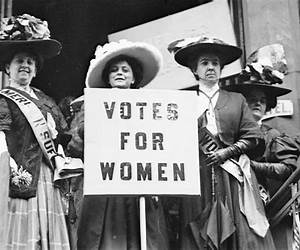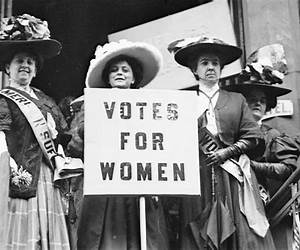The women's suffrage movement in america
In _The Woman Suffrage Movement in America A Reassessment_ Corinne M McConnaughy tackles the challenging question of explaining the timing and sequence of women s enfranchisement in the United States Conventional arguments about the women s vote as a bloc are less credible she argues than an argument based on programmatic considerations male politicians voted for women s enfranchisement when their own male constituencies supported it To succeed then women had to learn to build cross class and cross interest coalitions to mobilize the already enfranchised in support of their own cause This often came via lending their own support and mobilization efforts to the causes of the other group particularly the third party movement which helped them generate some of their notable successes. Who started the women's suffrage movement in america McConnaughy s work is an excellent example of how to use quantitative analysis in support of primarily qualitative work instead of the other way around She uses limited analysis of roll call data limited primarily by the availability of historical covariates to support her claims about the coalitions suffragists were building and how these affected legislators incentives to support woman suffrage The bulk of the evidence however is provided by meticulously sourced qualitative materials drawing extensively on archives of letters and other correspondence between suffrage groups their leadership legislators third parties and other related individuals The use of historical and archival sources is at least on par with the quality of their use in historical monographs which is unusual for political science scholarship This is someone who takes her evidence seriously and treats it with care. Was the women's suffrage movement only in america Through her detailed use of this evidence McConnaughy convincingly shows that women s coalitions were most clearly responsible for their initial successes in the states not their personal connections to legislators or potential as a partisan voting bloc She then extends that state level analysis to explain when and why the 19th Amendment passed at the national level when it did Her arguments about programmatic enfranchisement are strongly supported in both the coalitions behind the amendment s success and its timing. How did the women's suffrage movement impact american society Overall McConnaughy has written a clear concise phenomenally well researched account of coalition building and franchise reform in early 20th century America This book should be high on the reading lists of anyone interested in American political development generally as well as women s rights franchise reform or coalition politics The Woman Suffrage Movement in America A Reassessment

This book departs from familiar accounts of high profile woman suffrage activists whose main concern was a federal constitutional amendment It tells the story of woman suffrage as one involving the diverse politics of women across the country as well as the incentives of the men with the primary political authority to grant new voting rights those in state legislatures Through a mix of qualitative and quantitative evidence the book explains the success and failures of efforts for woman suffrage provisions in five states and in the U.
Women's suffrage movement in america S Congress as the result of successful and failed coalitional politics between the suffrage movement and important constituencies of existing male voters including farmers organizations labor unions and the Populist and Progressive parties The Woman Suffrage Movement in America A Reassessment.

 This book departs from familiar accounts of high profile woman suffrage activists whose main concern was a federal constitutional amendment It tells the story of woman suffrage as one involving the diverse politics of women across the country as well as the incentives of the men with the primary political authority to grant new voting rights those in state legislatures Through a mix of qualitative and quantitative evidence the book explains the success and failures of efforts for woman suffrage provisions in five states and in the U. Women's suffrage movement in america S Congress as the result of successful and failed coalitional politics between the suffrage movement and important constituencies of existing male voters including farmers organizations labor unions and the Populist and Progressive parties The Woman Suffrage Movement in America A Reassessment.
This book departs from familiar accounts of high profile woman suffrage activists whose main concern was a federal constitutional amendment It tells the story of woman suffrage as one involving the diverse politics of women across the country as well as the incentives of the men with the primary political authority to grant new voting rights those in state legislatures Through a mix of qualitative and quantitative evidence the book explains the success and failures of efforts for woman suffrage provisions in five states and in the U. Women's suffrage movement in america S Congress as the result of successful and failed coalitional politics between the suffrage movement and important constituencies of existing male voters including farmers organizations labor unions and the Populist and Progressive parties The Woman Suffrage Movement in America A Reassessment.